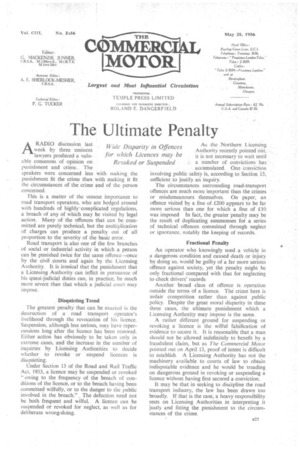The Ultimate Penalty
Page 31

If you've noticed an error in this article please click here to report it so we can fix it.
ARADIO discussion last week by three eminent lawyers produced a valuable consensus of opinion on punishment and crime.The speakers were concerned less with making the punishment fit the crime than with making it fit the circumstances of the crime and of the person concerned.
This is a matter of the utmost importance to road transport operators, who are hedged around with hundreds of highly-complicated regulations, a breach of any of which may be visited by legal action. Many of the offences that can be committed are purely technical, but the multiplication of charges can produce a penalty out of all proportion to the severity of the basic error.
Road transport is also one of the few branches of social or industrial activity in which a person can be punished twice for the same offence—once by the civil courts and again by the Licensing Authority. It is ironical that the punishment that a Licensing Authority can inflict in pursuance of his quasi-judicial duties can, in practice, be much more severe than that which a judicial court may impose.
Disquieting Trend The greatest penalty that can be exacted is the destruction of a road transport operator's livelihood through the revocation of his licence. Suspension, although less serious, may have repercussions long after the licence has been restored. Either action has obviously to be taken only in extreme cases, and the increase in the number of inquiries by Licensing Authorities to decide whether to revoke or suspend licences is disquieting.
Under Section 13 of the Road and Rail Traffic Act, 1933, a licence may be suspended or revoked "owing to the frequency of the breach of conditions of the licence, or to the breach having been committed wilfully, or to the danger to the public involved in the breach." _ The defection need not be both frequent and wilful. A licence can be suspended or revoked for neglect, as well as for deliberate wrong-doing. As the Northern Licensing Authority recently pointed Oat, it is not necessary to wait until a number of conviction's has accumulated. One convietion involving public safety is, according to Section 13, sufficient to justify an inquiry.
The circumstances surrounding road-transport offences are much more important than the crimes or misdemeanours themselves. On paper, an offence visited by a fine of £200 appears to be far more serious than one for which a fine of £10 was imposed In fact, the greater penalty may be the result of duplicating summonses fot a series of technical offences committed through neglect or ignorance, notably the keeping of records.
Fractional Penalty An operator who knowingly used a vehicle in a dangerous condition and caused death or inky by doing so, would be guilty of a far more serious offence against society, yet the penalty might be only fractional compared with that for neglecting to check drivers' records Another broad class of offence is operation outside the terms of a licence. The crime here is unfair competition rather than against public policy. Despite the great moral disparity in these three cases, the ultimate punishment which a Licensing Authority may impose is the same.
A rather different ground for suspending or revoking a licence is the wilful falsification of evidence to secure it. It is reasonable that a man should not be allowed indefinitely to benefit by a fraudulent claim, but as The Commercial Motor pointed out on April 13, proof of intent is difficult to establish A Licensing Authority has not the machinery available to courts of law to obtain indisputable evidence and he would be treading on dangerous ground in revoking or suspending a licence without having first secured a conviction.
It may be that in seeking to discipline the road transport industry, the law has been drawn too broadly. If that is the case, a heavy-responsibility rests on Licensing Authorities in interpreting it justly and fitting the punishment to the circumstances of the crime.














































































































